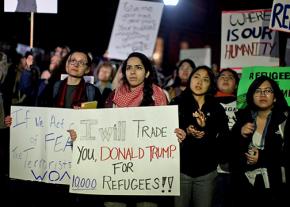Thanksgiving double standards
The ironies of Thanksgiving are more intense this year, writes .
FOR MANY who believe in justice for indigenous peoples, there is always something unsettling about celebrating Thanksgiving.
As the holiday on which the greatest number of families gather, in a country where work and distance make family gatherings difficult, many of us appreciate Thanksgiving as an opportunity to spend time with important people in our lives. But the actual reason for the holiday is one of the United States' founding myths: that despite the things that got in the way of warm relations between the Pilgrims and Indigenous peoples of Massachusetts--such as the violent theft of the latter's land by the former--these groups of people put their differences aside as the Natives showed kindness to the Pilgrims with a feast.
Nowhere does this story loom larger than in Massachusetts, the place where the Pilgrims arrived. The Pilgrims' landing and the Thanksgiving story are prominent features of the state's official identity. Many of the "Welcome to Massachusetts" signs one sees when crossing in from neighboring states have pictures of turkeys on them, a symbol of the holiday. The official symbol of the main highway in the state, the Massachusetts Turnpike, is a Pilgrim's hat. In Plymouth, there is a replica of the Mayflower ship on which the Pilgrims sailed to North America, part of a recreated settler village.

Each year, Native Americans and their supporters mark the holiday with a National Day of Mourning march in Plymouth. The event calls attention to the ethnic cleansing that began with the Europeans' arrival, and that continues to this day. After all, while children across the country learn the Thanksgiving story in school, they are rarely taught about the massacres that the Pilgrims carried out against people who were here first.
THIS YEAR, in addition to the ongoing injustice to indigenous peoples, there is another injustice that comes to mind on Thanksgiving: Massachusetts Gov. Charlie Baker's joining with other politicians in opposing the resettlement of Syrian and Iraqi refugees here.
The Pilgrims were, by today's definition, refugees. They were fleeing religious persecution and seeking a better life in America. Unlike Syrian and Iraqi refugees, who have only shown the desire to start new lives in Europe and the U.S., the Pilgrims came to radically reshape this place through settlement and violence.
Shortly after voting in the U.S. House of Representatives to effectively stop the federal government's refugee resettlement program, Bill Keating, one of two Massachusetts Democrats who voted in favor of the bill, wished everyone a "Happy Thanksgiving from America's Hometown" on his official Facebook page. Keating's district includes Plymouth and other parts of the state where the Pilgrims settled. That he could vote to bar refugees from entering the U.S. and at the same time celebrate a founding myth of the country based upon compassion for newcomers to the Americas fleeing oppression is ironic, to say the least.
In addition to the Pilgrims, there is another group of migrants to Massachusetts whose presence shaped the state's identity. Irish migration to Boston in the 19th century had an impact that continues to this day. Hoodies and t-shirts featuring the city's name alongside a shamrock are available for sale all over the area. Schools are closed on St. Patrick's Day. The professional basketball team is the Boston Celtics, whose mascot is a caricature of a leprechaun.
The wave of Irish people who came to Boston in the 1800s were also refugees. They were fleeing a famine in Ireland and the oppression of the British crown. No doubt many believed that if they stayed in Ireland, they would die. A century and a half later, Irish migration to Boston is celebrated by the city and state political establishment. Yet members of that establishment are walling out today's migrants desperate for a new home.
Thankfully, the politicians' opposition to refugee resettlement and their complicity in the oppression of Native Americans isn't the only story this Thanksgiving.
At Amherst College, a group called Amherst Uprising is demanding that the college's mascot be changed, among several anti-racist demands. The mascot, "Lord Jeff," refers to Lord Jeffrey Amherst--the British army officer credited with introducing smallpox-infected blankets among Native Americans as part of the colonists' series of wars on Indigenous people.
Amherst students carried out a four-day-long sit-in as part of the national wave of anti-racist protests on campuses, with the mascot demand high among them. Plus, more than 1,000 people gathered at the State House in Boston on November 20 to protest Baker's opposition to resettling refugees here.
With the politicians' hypocrisy on full display, today's struggles for justice show a different, more hopeful way.


